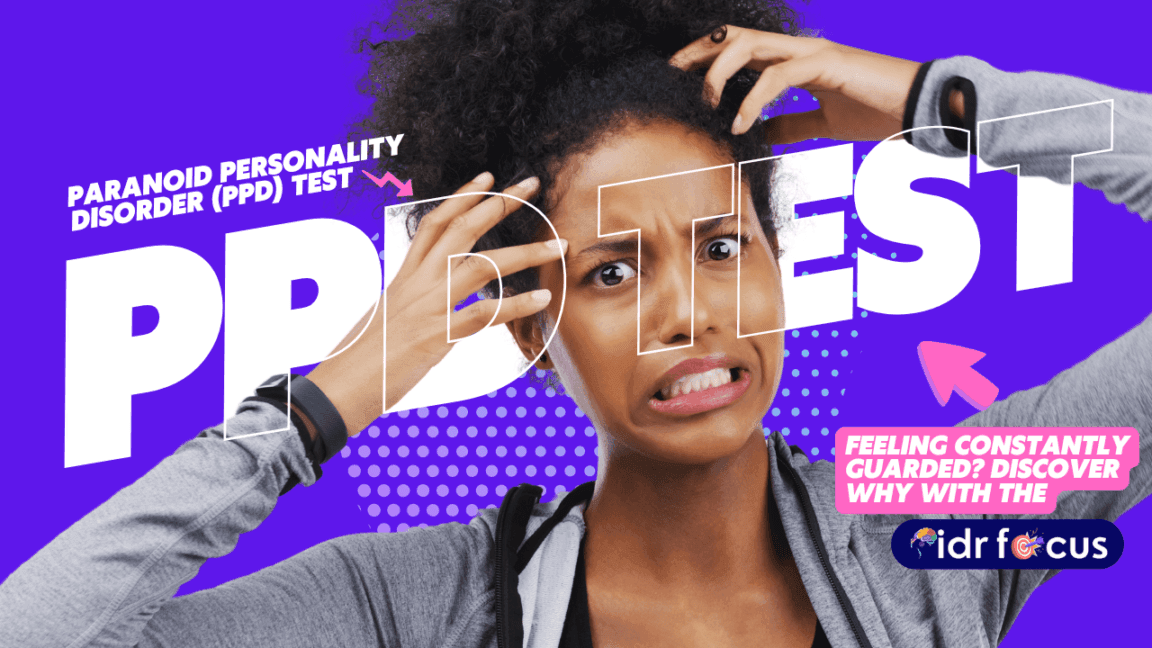The Insightful Paranoid Personality Disorder Test
This simple, easy-to-take Paranoid Personality Disorder test helps you explore and understand your thoughts and feelings, especially those that might lean towards paranoia. With straightforward questions, this test offers a gentle starting point to reflect on your mental well-being. This design aims to foster self-awareness and encourage further discussions with a professional. Always remember: understanding your mind is a crucial step to wellness, and every bit of insight helps pave the way.
What Is the Paranoid Personality Disorder?
Paranoid Personality Disorder (PPD) is a mental health disorder characterized by persistent and pervasive mistrust and suspicion of others, even when there’s no reason to be suspicious. People with PPD are often on guard, believing others constantly try to demean, harm, or threaten them. These deeply ingrained mistrustful beliefs can negatively impact their relationships, as they often find it difficult to trust even close friends and family members. They might interpret harmless comments or actions as malicious, leading to hostility or social isolation. Unlike paranoid schizophrenia, where delusions and hallucinations exist, individuals with PPD remain in touch with reality but view the world through doubt and suspicion.
Why Take The Paranoid Personality Disorder Test?
Embarking on this introspective journey allows you a window into your internal thought processes, providing preliminary insights that could illuminate paths toward professional support and strategies to manage or mitigate paranoid thinking.
Expert Insight
One well-known psychologist specializing in personality disorders, including Paranoid Personality Disorder (PPD), is Dr. Aaron T. Beck. He earned renown for developing cognitive therapy (now called cognitive-behavioral therapy or CBT), which practitioners utilize for various mental health conditions, including PPD. Dr. Beck and his colleagues have written extensively on personality disorders and developed therapeutic approaches for addressing them.
Dr. Beck’s work, alongside other research, underscores the importance of early intervention and the utilization of cognitive-behavioral approaches in managing personality disorders like PPD. Implementing these strategies, especially in at-risk populations or those showing early signs, can be crucial in managing and potentially mitigating the disorder’s impact on an individual’s life.
How the Paranoid Personality Disorder Test Works
The quiz consists of carefully crafted questions designed to draw out responses that could indicate a paranoid thought pattern. Your answers will act as tiny mirrors, reflecting aspects of your mental state that need a closer look.
Scoring is Assigned as Follows:
- “Not at all” is scored as 0.
- “Somewhat” is scored as 1.
- “Absolutely” is scored as 2.
The total score range is 0-20.
Interpreting Your Test Results
- 0-6: Low Paranoid Inclination.
- 7-14: Moderate Paranoid Inclination
- 15-20: High Paranoid Inclination
Recommendations to Prevent It:
Integrate mindfulness exercises and social support into your routine, and remember that embracing professional advice can unlock tailored strategies to navigate through paranoid thoughts, fostering a healthier mental space.
Important Note
It’s imperative to remember that this quiz does not serve as a diagnostic tool. Only a certified mental health professional can provide a legitimate diagnosis of Paranoid Personality Disorder or any other mental health disorder.
Instructions:
Select the option that resonates most accurately with your feelings and experiences in response to each statement. Approach each question honestly and without overthinking to ensure the most authentic reflection of your mental state.
Disclaimer
The results from this Paranoid Personality Disorder test should be utilized as a preliminary step and are not definitive of any specific disorder. Mental health is multifaceted and complex – any concerns should be discussed directly with a healthcare professional who can accurately diagnose and support your mental health journey.
Other Personality Tests You Can Take
- Question of
Feeling Targeted: Do you sense a collective effort from others intending to cause you personal distress or harm?
- Not at all
- Somewhat
- Absolutely
Correct Wrong
- Question of
Trust in Loyalty: Even when people demonstrate loyalty, do you still find their intentions dubious?
- Not at all
- Somewhat
- Absolutely
Correct Wrong
- Question of
Hidden Agendas: Do you often perceive that those around you harbor secret intentions to exploit or deceive you?
- Not at all
- Somewhat
- Absolutely
Correct Wrong
- Question of
Hesitancy in Sharing: Is there a tendency to withhold personal information or emotions due to a fear of betrayal?
- Not at all
- Somewhat
- Absolutely
Correct Wrong
- Question of
Vigilance in Relationships: Do you find yourself intensively scrutinizing the actions and motives of close ones for potential deceit?
- Not at all
- Somewhat
- Absolutely
Correct Wrong
- Question of
Deliberate Provocations: Do you perceive that individuals intentionally behave or speak to trigger negative reactions from you?
- Not at all
- Somewhat
- Absolutely
Correct Wrong
- Question of
General Suspicion: Is there a consistent wariness towards people and their motivations in your interactions?
- Not at all
- Somewhat
- Absolutely
Correct Wrong
- Question of
Internal Jealousy: Do feelings of jealousy frequently consume you, even if unexpressed outwardly?
- Not at all
- Somewhat
- Absolutely
Correct Wrong
- Question of
Behind-the-Back Conversations: Are there thoughts suggesting others engage in negative discussions about you in your absence?
- Not at all
- Somewhat
- Absolutely
Correct Wrong
- Question of
Reputation Sabotage: Do you sense a desire among your acquaintances to tarnish your public image?
- Not at all
- Somewhat
- Absolutely
Correct Wrong


